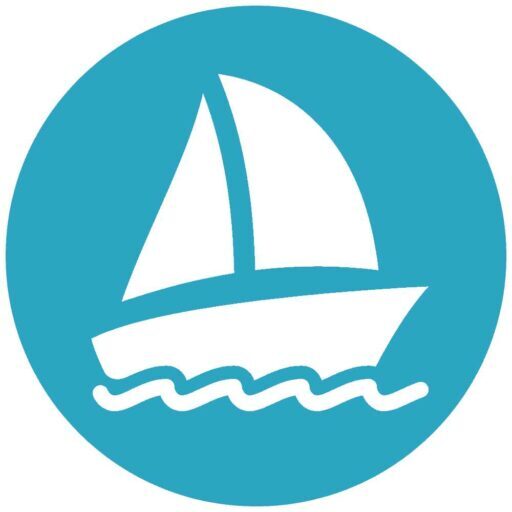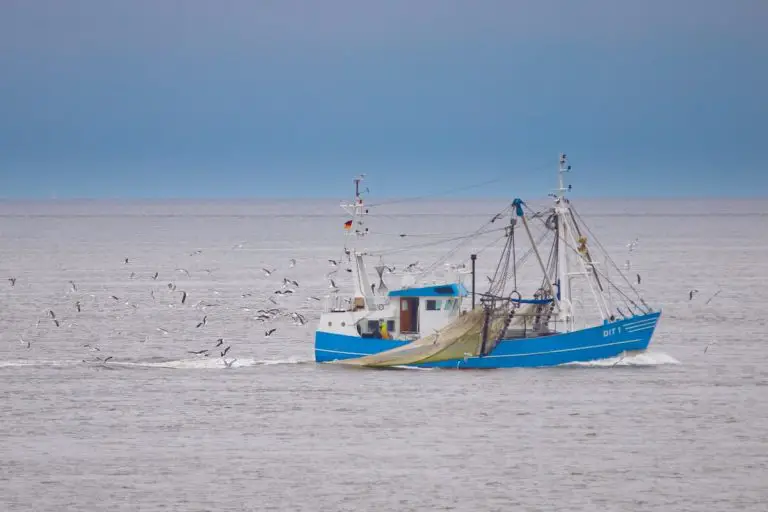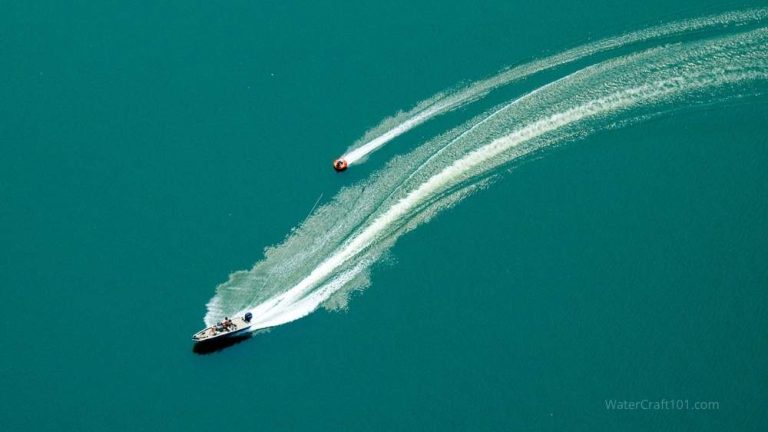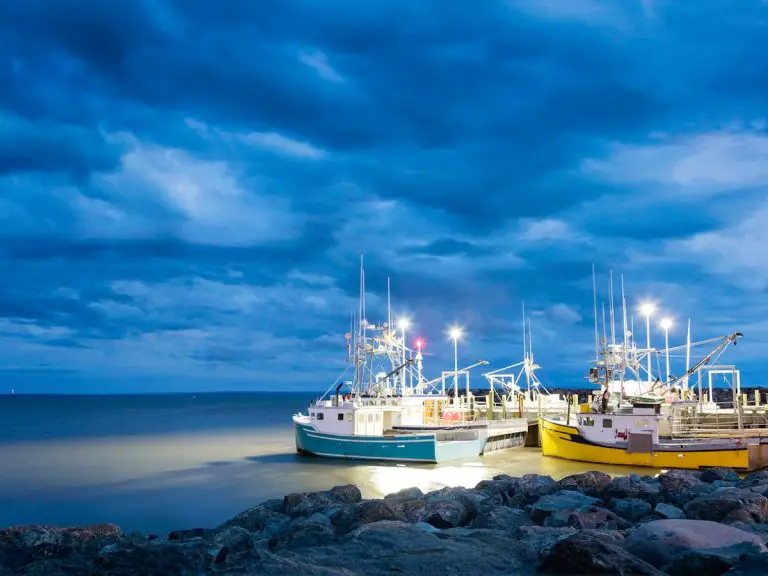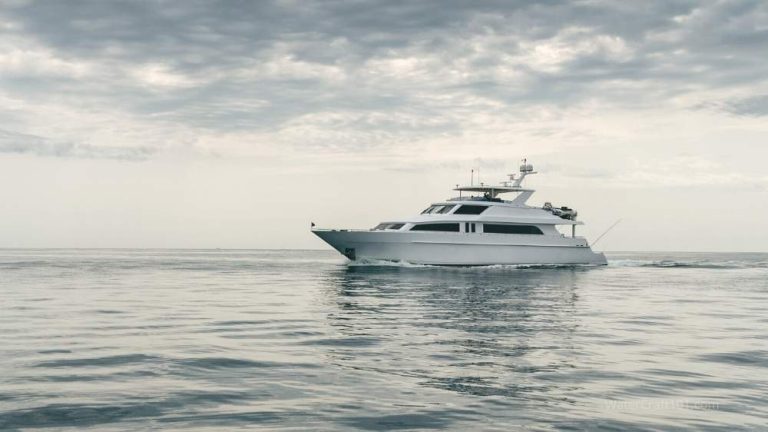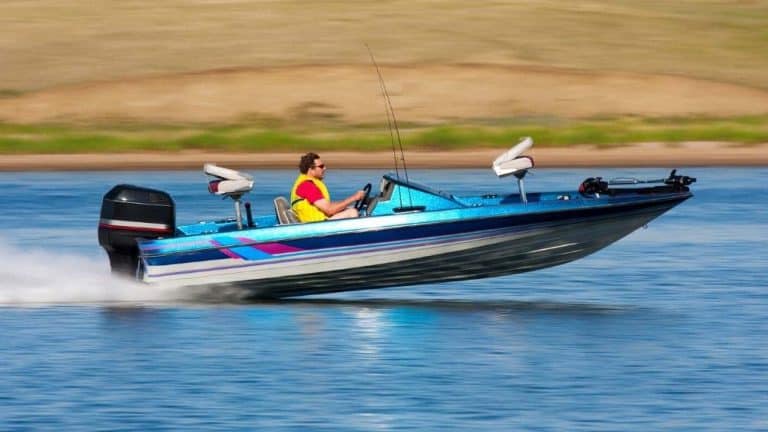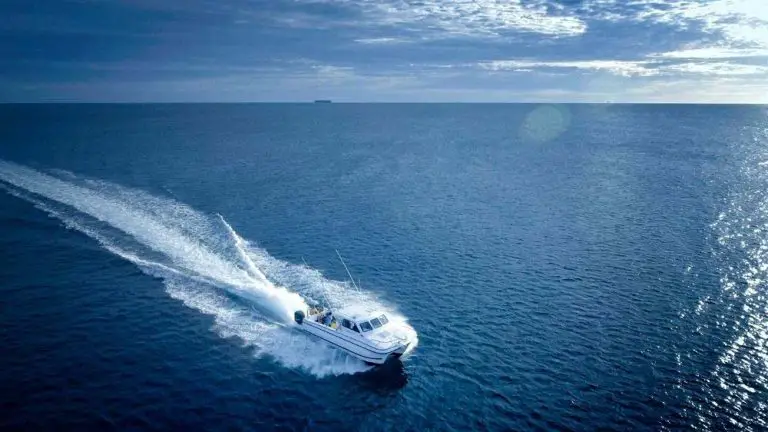How Much A Good Fishing Boat Should Cost (A Price Guide)
Boats specifically designed for fishing represent a significant financial outlay, and the huge number of models and price tags can get confusing. Sometimes too many choices makes the decision even more complicated when trying to find an appropriate fishing boat. So, how much is a good fishing boat and how much should you be prepared to pay?
A brand new, midrange fishing boat will cost between $20,000 – $50,000. While a good used fishing boat should cost you in the range of $18,000 – $35,000. Your needs as a fisherman and your budget will determine whether a new or used fishing boat is the best choice for you.
Evaluating what a good fishing boat should cost means that we’ll want to first identify what a quality boat for fishing looks like. We’ll also examine what you actually need in a fishing boat, and what you should look for in terms of fishing features to make your experience more pleasurable. Finally, we’ll compare a new boats’ cost versus that of a used boat, and other considerations you should keep in mind when looking to become a fishing boat owner.

What Makes A Good Fishing Boat?
Many people consider this question to be dependant on the person asking it. While that may be true, there are some general criteria we can use to define what a good fishing boat is. It will give us a solid baseline expectation to work from as we progress to topics that pertain to the pricing of these boats.
Here are some criteria that we feel would constitute the characteristics of a good fishing boat.
- Reliability – The boat must be reliable and work when you need it to, especially in situations that present safety issues.
- Appropriate size – The boat must be large enough to handle the size and conditions of the body of water that you fish most frequently. Small boats on large lakes are notorious for resulting in accidents.
- Hull design – The hull must have the appropriate design for the type of waters and fishing you do most often. If you’re mostly freshwater fishing in a shallow water lake, you will need a different hull than if you’re deep sea fishing in saltwater. Your average type of fishing trip should determine the best hull design for you.
- Quality of manufacture – A boat built with care and derived from quality materials is less likely to have issues, and your investment will last longer.
- Availability of parts and support – Boats that do not have local support, parts, and maintenance may be more expensive in the long term than a more expensive boat with local support.
- Carrying capacity – A good fishing boat will have enough capacity to carry the number of people that generally fish with you. For instance, you’ll need at least one fishing rod holder for every angler on the boat. Overcrowded boats make for cramped conditions on board, a lousy fishing experience, and present safety issues.
- Fish storage capacity – Many boat buyers look at all the boat’s performance aspects and neglect to check the boat’s fish-holding capacity. A good fishing boat will have ample livewell storage for fish, as well as a cooler compartment for non-live catches.
Keep these aspects of what makes a good fishing boat in mind as we discuss what you truly need in a fishing boat.
Determine What You NEED in a Fishing Boat
When you start comparing the prices of fishing boats to the size of your bank balance, you will quickly appreciate the art of selecting a boat with the features you NEED compared to a boat with the features you WANT.
The best way to establish what you need in a fishing boat is to sit down with a pencil, grab a piece of paper, and evaluate your needs. It will work as a guideline to develop a boat specification that will meet your needs as a fisherman. It’s easy to get distracted by all the extra “bells & whistles” while missing out on the important features you actually need for the way you fish.
This following list contains potential items you should consider for your needs list of features for your fishing boat.
- Hull material – Would a fiberglass hull be suitable for your fishing needs, or would an aluminum fishing boat be a better choice? An aluminum boat is lighter, while fiberglass is heavier but more stable on the water.
- Onboard electronics – Decide what you need for boating in the way of electronic gear. Do you need a fish finder, depth sounder, a GPS unit, VHF radio, or will a basic fish finder be sufficient for your needs?
- Engine size – The motor is a significant factor in the cost of a boat. Unless you are a competitive fisherman, do you really need a bigger engine for the additional speed to get to and from your fishing spot?
- Boat storage – Where will you be keeping your boat when it is the off season. Do you have sufficient space in your garage, or will you need to rent storage space because you opted for an unnecessarily big boat?
- What do you fish for? – Angling for different fish species may have different requirements in the boat you choose and the features available. For example, are you into inshore or offshore fishing? It will make a difference in the type of watercraft you’ll want.
Once you have detailed your needs in a fishing boat, we can start to look at your choices and how that will affect the final price of the boat you will plan on purchasing.
What Size Fishing Boat Do You Need?
The size of the fishing boat will affect the sale price in a big way. Larger boats use more materials in their manufacture, and require a significantly bigger outboard motor, and larger trailers.
Buying a larger boat than what you really need will contribute to a higher purchase price for the boat.
On the other hand, choosing a too-small boat for your needs is as impractical as choosing one that is too big. You will not enjoy your fishing trips on a cramped, under powered boat. Before you know it you’ll be looking for an upgrade, or lose interest in using the boat entirely. It’s all about finding the right balance.
Average Boat Sizes
Inshore fishing boats meant for lakes, rivers, and shallow waters (less than 100′ deep) are not generally large boats. Considering the relatively high price of fishing boats, choosing the right-sized boat will make sure you don’t waste extra money on a longer boat you don’t need.
| Boat Type | Average lengths |
|---|---|
| Inshore fishing boat | 17 – 22 feet |
| Cruising or pleasure boat | 20 – 30 feet |
| Watersport or ski boats | 17 – 25 feet |
When you consider these average lengths by boat type, you may think there is not much difference between 17 and 22 feet! Indeed, an additional 5 feet in boat length will affect the price significantly!
To give you some indication of how a boat’s size can affect the price, here are a few examples of bass fishing boats and their corresponding prices.
| Boat | Length | Price |
|---|---|---|
| Ranger Z175 | 17-feet 6-inches | $32,995 |
| Ranger Z518L | 18-feet 10-inches | $51,270 |
| Ranger Z521L | 21-feet 8-inches | $75,295 |
| Ranger 622FS Pro | 22-feet 10-inches | $88,895 |
We have stuck to a single boat brand here to make sure that we are comparing similar products. As we can see from this data, there is a length difference between the smallest boat and the longest boat of 5-feet 4-inches, but the price difference is $55,900!
It is quite a spread in cost, equating to just over $11,000 per foot in length difference! It illustrates the point of buying the right size boat for your needs rather than going overboard with the size.
You can allocate the additional money you save in length towards tricking the boat out with other features that would be more useful to your fishing style than the boat’s size.
What Size Engine Do You Need On A Fishing Boat?
Most boats will have a recommended maximum horsepower engine for each particular model as determined by the manufacturer. This information will be generally indicated on the boat’s information plate.
For example, the Ranger Z175 bass boat has a recommended maximum engine size of 115HP.
Exceeding this engine capacity can be dangerous. The engine mounts are designed to handle this size engine’s weight and torque. Using a heavier, more powerful engine can strain these fittings and cause them to fail.
A larger engine will drive the boat at faster speeds, resulting in damage to the hull if it is not designed for the stresses of these kinds of high speeds.
Also, just because your boat is rated for a 115HP engine, you do not necessarily have to go for the most powerful engine your boat can handle. If your particular engine requirements are less than the maximum, save yourself some cash and get a lower horsepower engine.
Formula to Determine Proper Boat Engine Size
The basic formula for calculating the right sized engine for your boat is to use the weight to horsepower ratio. To use this formula, take the boat’s weight and add the maximum load of all the added contents (including people) in pounds.
Divide this number by the horsepower rating of the engine. If the resulting number is between 25 and 40 pounds per horsepower, then you should be good. The lower this number, the faster the engine will propel the boat under load.
Boat weight + maximum load weight / engine HP = pounds per horsepower
If we use the Ranger Z175, with the maximum sized 115HP motor, as an example, we have the following:
- Boat weight = 1250 lbs
- Maximum Content weight = 1200 lbs (including people)
Applying these numbers to the formula, we then have:
(1250 + 1200) / 115 = 21.3 This means that a 115HP engine is very powerful and will be able to provide close to maximum speed for this particular boat.
If we equip the boat with a 90HP motor instead, we get the following result:
(1250 + 1200) / 90 = 27.2 This is a bit slower than the bigger engine but still well within the 25 to 40 range.
The cost of a Mercury 115 engine is $12,135, while a Mercury 90 engine’s price is $10,590. It is a savings of $1,545 for opting for a slightly smaller engine.
It proves that by paying careful attention to your needs in a fishing boat and pricing the components accordingly, you can shave significant amounts off the final price and still get everything you need.
What Technology Do You Need On A Fishing Boat?
If you mostly fish in waters that you are very familiar with, your technology requirements onboard the boat may be significantly less than if you regularly fish in unfamiliar waters.
Your tech needs will also vary depending on the size of the body of water that you most frequently fish, as well as the type of fishing you do. If you are purely a recreational angler, your tech needs may be relatively low.
If you are a professional fisherman or fish competitively, you will need a broader range of technology to give you the edge you need to track those big fish quickly.
Scaling back the amount of electronic gear in the boat can reduce the final cost outlay required to purchase the boat by a lot. There is no sense in paying a higher price for electronics that you may use very rarely, if ever.
Probably the only piece of electronic gear that would be of most use for every angler would be a good fish finder.
New Fishing Boats (Pros, Cons & Prices)
Many people interested in acquiring a fish boat will take a look at what is available in the new boat market. It can be a good strategy but can have several downsides as well. We will take a brief look at the advantages of buying a new boat off the showroom floor and some of the disadvantages associated with this, as well.
Pros For Buying A New Fishing Boat
There are several advantages to traveling down this road and investigating the purchase of a brand-new boat.
- Latest designs – When you buy a new boat, you get access to the latest design changes that the manufacturer has incorporated into their new models. It can have advantages and improvements in the handling of the boat, plus developments that make it a more comfortable fishing platform.
- Latest technology – Any electronics installed on the boat will have the latest hardware and software systems installed. They would have corrected any bugs that may have arisen in older model versions of the technology.
- A zero-hour motor – The engine on the boat will have zero hours on the clock. It means that you know the motor’s exact condition and what you can expect from a reliability and performance point of view.
- Sound mechanisms – All the boat’s mechanisms and systems will be in perfect working order with no need to wonder about reliability.
- Pristine finish – The finish on a new boat is a thing of beauty, and when purchasing a new boat, you have a pristine finish that you can be proud of owning.
- Warranty – The warranty from the manufacturer of a new boat, and a new engine will give you security and a level of confidence in your purchase for years to come.
- Customization – Manufacturers allow you to make customizations to ensure that the boat you get is the boat you need. It means that you can get a boat that is manufactured and outfitted precisely according to your choices and needs.
Cons For Buying A New Boat
There are usually downsides to any choice, and buying a new boat is no exception, so there has to be a downside to this deal.
- High purchase price – A new boat’s price tag is the biggest con, and the one that you and your bank account will remember the most. There are no two ways about it; brand-new fishing boats are expensive!
- Depreciation – As with any vehicle, boats start to depreciate immediately after you take it off the dealer’s lot. As the boat’s first owner, you will feel the depreciation burden more than any subsequent owners of the boat. You can mitigate this depreciation problem to some extent by purchasing a boat brand that is known to hold a good resale value. The downside to this is that the purchase price of these better brand boats is generally higher to begin with.
New Fishing Boat Prices And Recommendations
New fishing boats have very distinct price ranges based on how they are positioned in the market. There are entry-level boats, mid-range boats, and top-end boats.
- Entry-level boats would be for anglers with either a very restricted budget or ones that only fish occasionally.
- Mid-ranges boats would be for the more serious amateur fisherman who gets out to fish almost every weekend and is willing to spend a bit more money for a better boat.
- Top-end fishing boats are considerably more expensive and usually are only within the financial range of professional anglers who need to have a high-end boating experience to give them a competitive edge in their fishing.
| Level | Average Price |
|---|---|
| Entry-level fishing boats | $10,000 to $20,000 |
| Mid-range fishing boats | $20,000 to $50,000 |
| Top-end fishing boats | $50,000 to $100,000 + |
In most instances, a decent fishing boat would be one that falls into the mid-range category. These boats would have enough of the new technology and modern design enhancements to make them an asset to the average fisherman, while still having an affordable price.
Here are a couple of examples of excellent mid-range fishing boats available at a reasonable price.
| Model | Specifications | Cost |
|---|---|---|
| Ranger Z518 | – Length: 18-feet 10-inches – Beam: 97-inches – Engine: Mercury 150 L Pro XS | $42,995 |
| Nitro Z19 Pro | – Length: 19-feet 4-inches – Beam: 94-inches – Engine: Mercury 200 L Pro XS | $44,995 |
Used Fishing Boats (Pros, Cons & Prices)
Buying a used fishing boat gives you the option to get a quality boat at a more reasonable price. Don’t expect used fishing boats to be exceptionally cheap, however, since these well-made boats generally retain a better resale value compared to many other types of vessels.
As with buying a new boat, there are pros and cons to purchasing a used fishing boat:
Pros For Buying A Used Fishing Boat
A used fishing boat can be a great way to get your hands on a good craft without paying a new boat’s high prices. Here are some of the benefits of searching the secondhand market for a fishing boat.
- Lower purchase price – The lower price has to be the most significant benefit to buying a secondhand fishing boat. The lower price makes it easier for more people to enter the market and get started.
- Many good condition boats available – Because many of the upmarket brands are durable boats made with quality materials and care, they have a long lifespan and can still be in excellent working condition at 10 or even 15-years old. When they were new, the high price of these boats means that the previous owner probably took good care of the boat.
- More readily available – When you order a new boat from a dealer, it can take up to two months or more to receive your customized boat. Buying from the secondhand market, will allow you more ready access to a wide selection of boats.
- Many of these boats have lasting value – This means that you can get a great looking boat, in excellent condition, that may even look new, but yet still pay a used price.
- Less depreciation – You would be able to sell your boat a few years later and get a similar price to what you bought it for initially. The first owner of the boat is always the one who pays the highest depreciation cost.
Cons For Buying A Used Fishing Boat
There are more cons for buying a secondhand boat than for buying a new boat, but if you take your time and carefully inspect prospective purchases, you can overcome most of the dangers of purchasing a used boat.
- Buying someone else’s problem – It is probably the most significant concern when buying a used boat. There can be hidden problems and faults that only manifest once the purchase has gone through and you finally get to put the boat in the water.
- Older designs – Buying an older boat means that you will not get a boat with the latest design changes that improve comfort, performance, and utility.
- Older electronics – Any electronic systems onboard could be dated and not have the latest functions and features. You could upgrade these components, but that would mean putting more money into an older boat.
- Well-used engines – The engine is the powerhouse of the boat; some would say the heart and soul. There is nothing worse than having an unreliable problematic engine on a boat that lets you down when you least expect it. It would be best if you exercised care when purchasing a used boat to ensure the engine is in good condition before going ahead with the sale.
Used Fishing Boat Prices And Recommendations
So, when we get down to the pricing of a secondhand boat, what range can you expect to pay, and what kind of condition can you expect of the boats?
Most secondhand fishing boats between 10 to 20-years old are still in pretty good shape for their age. These expensive boats have often been well taken care of, which means their condition is still good. The primary concern would be the motor, which is probably the part of the boat that has suffered the most over the years.
When buying a used boat, it is recommended that you get a professional to examine the motor to confirm its condition before agreeing to the purchase price.
That said, you can still get a great quality, mid-range fishing boat for between $18,000 – $35,000. On the upper range of the scale, you could get a larger boat with a more powerful engine for the same price as a new mid-range boat.
When selecting a used boat, our recommendation is to opt for a boat brand that has a reputation for reliability and retaining its resale value due to the quality of its manufacture.
Final Thoughts
A decent fishing boat is one that meets your fishing requirements and also falls within your budget. For some fishermen, this will be a new boat costing upwards of $50,000. For others, a used boat that costs under $20k would meet their needs quite comfortably.
Finding the right boat for you is the primary goal. Bear in mind that a boat is a large investment for a vehicle whose sole purpose is for an abridged season of the year. For the rest of the time, it incurs storage fees or gathers dust in your garage.
Therefore, you should focus your boat buying energy to find a boat that you will get the most use out of, even if that includes getting an all purpose fishing boat that could find a use for other water activities, as well. It will allow you to get maximum use out of your sizable investment.
Related Posts:
- Why Are Fishing Boats So Expensive?
- Are Fishing Boats Fast?
- Boat Ownership Costs And Expenses (Read This Before You Buy!)
- Why Are Bayliner Boats So Cheap?
Sources:
